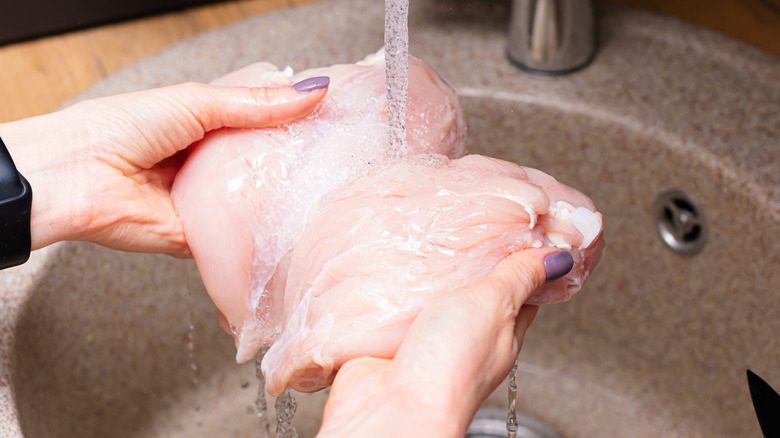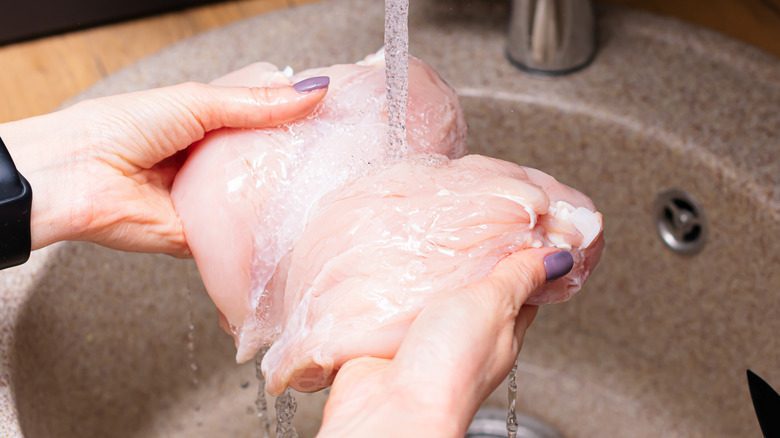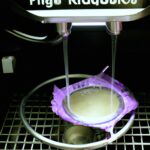
When it comes to cooking meat, many people have made it a habit to rinse it off before cooking, thinking that this will help remove any potential germs or bacteria. However, rinsing meat before cooking is not only unnecessary, but it can also be counterproductive. Meat bought at the grocery store or local butcher has already been cleaned, and washing it at home is redundant. In fact, rinsing raw meat can increase the risk of cross-contamination in the kitchen, leading to foodborne illnesses. The best way to handle raw meat is to keep it in its original packaging until it’s time to cook, use separate cutting boards and utensils, and ensure that it reaches the proper internal temperature during cooking. Following these food safety guidelines is the key to a delicious and germ-free meal.
Reasons why rinsing or washing raw meat isn’t necessary
When it comes to handling raw meat, there is often a debate about whether it should be rinsed or washed before cooking. Many people believe that this step is necessary to remove any potential bacteria or contaminants. However, there are several reasons why rinsing or washing raw meat isn’t necessary, and may even be harmful. In this article, we will explore these reasons in detail and provide guidance on proper handling of raw meat to ensure food safety.
Raw meat bought at grocery stores or local butchers is already cleaned
One of the main reasons why rinsing or washing raw meat isn’t necessary is because the meat bought at grocery stores or local butchers has already been cleaned. The styrofoam and plastic trays that are used to contain raw meat at supermarkets are designed to keep germs or any other foreign substances from coming into contact with the meat. Therefore, washing it at home would be redundant and unnecessary.

This image is property of www.chowhound.com.
Using anything other than water to clean meat can be harmful
Another reason why it is not recommended to rinse or wash raw meat is that using anything other than water to clean it can be harmful. This includes dish detergents or other cleaning agents. These substances can not only impart an unpleasant taste to the meat, but if not rinsed off completely, they can also pose a risk of ingesting chemicals, leading to serious gastrointestinal issues. Therefore, it is best to avoid using anything other than water when handling raw meat.
Rinsing raw meat can lead to cross-contamination
Perhaps the most compelling reason to avoid rinsing raw meat is the risk of cross-contamination in the kitchen. According to research from the USDA, rinsing raw meat, poultry, or seafood can increase the risk of cross-contamination, which can cause foodborne illnesses. When you wash raw meat, it can come into contact with more surfaces than it would if you were to cook it immediately. For example, while rinsing a piece of beef in the sink, water can splash onto the countertops, spreading bacteria. If the sink is not fully sanitized after rinsing raw meat, it can further contaminate other items in the kitchen. This can lead to the spread of harmful bacteria and increase the risk of foodborne illnesses.
Splashback of bacteria during rinsing
During the process of rinsing raw meat, there is a potential for bacteria to splash back onto nearby surfaces. This can occur when water or juices from the meat come into contact with the sink, countertops, or other kitchen tools. Even if you are careful while rinsing the meat, it is difficult to control the splashing of bacteria-containing water. This can further contribute to the cross-contamination mentioned earlier. Therefore, it is best to avoid rinsing raw meat altogether to minimize the risk of spreading bacteria in the kitchen.
Failure to fully sanitize the sink after rinsing raw meat
Proper sanitation is crucial in preventing the spread of bacteria in the kitchen. If you choose to rinse raw meat, it is essential to fully sanitize the sink afterward. Failure to do so can result in contamination of the sink, which can then contaminate dishes, utensils, or other surfaces that come into contact with it. It is important to remember that bacteria can survive and multiply in moist environments. Therefore, thorough cleaning and sanitizing of the sink are necessary to maintain a safe and germ-free kitchen environment.
Proper handling of raw meat to avoid contamination
Instead of rinsing or washing raw meat, it is important to focus on proper handling techniques to avoid contamination. Here are some guidelines to follow:
Keeping meat in its original packaging and away from other foods
To minimize the risk of cross-contamination, it is best to keep raw meat in its original packaging until it is time to cook. Placing the meat in a separate bag or container can further prevent any potential exposure to other foods in the refrigerator. Raw meat should also be stored on the bottom shelf of the refrigerator to prevent any drips or leaks from contaminating other foods.
Using a separate cutting board and knife for raw meat
Using a separate cutting board and knife specifically designated for raw meat is essential to prevent cross-contamination. This ensures that any bacteria present in the raw meat does not come into contact with other foods, such as fruits, vegetables, or cooked items. It is important to thoroughly wash and sanitize the cutting board and knife after each use to eliminate any traces of bacteria.
Following food safety guidelines for a germ-free meal
Cooking raw meat to the proper internal temperature is crucial for food safety. The CDC provides guidelines for the recommended internal temperatures for various types of meat. For example, finned fish and red meat like beef, lamb, and pork should reach an internal temperature of 145 degrees Fahrenheit, ground meat should be at least 160 degrees, and poultry must reach 165 degrees. Using a food thermometer is the most reliable way to ensure that meat has reached the appropriate temperature.
In conclusion, while it may be a common practice to rinse or wash raw meat before cooking, it is not necessary and can even be harmful. Raw meat bought at grocery stores or local butchers is already cleaned, and using anything other than water to clean meat can be detrimental. Rinsing raw meat can lead to cross-contamination and the splashback of bacteria. Additionally, failure to fully sanitize the sink after rinsing raw meat can contribute to the spread of harmful bacteria. Instead, proper handling techniques, such as keeping meat in its original packaging, using separate cutting boards and knives, and following food safety guidelines for cooking, should be prioritized to ensure a germ-free meal. By following these guidelines, we can maintain a safe and sanitary kitchen environment and reduce the risk of foodborne illnesses.






